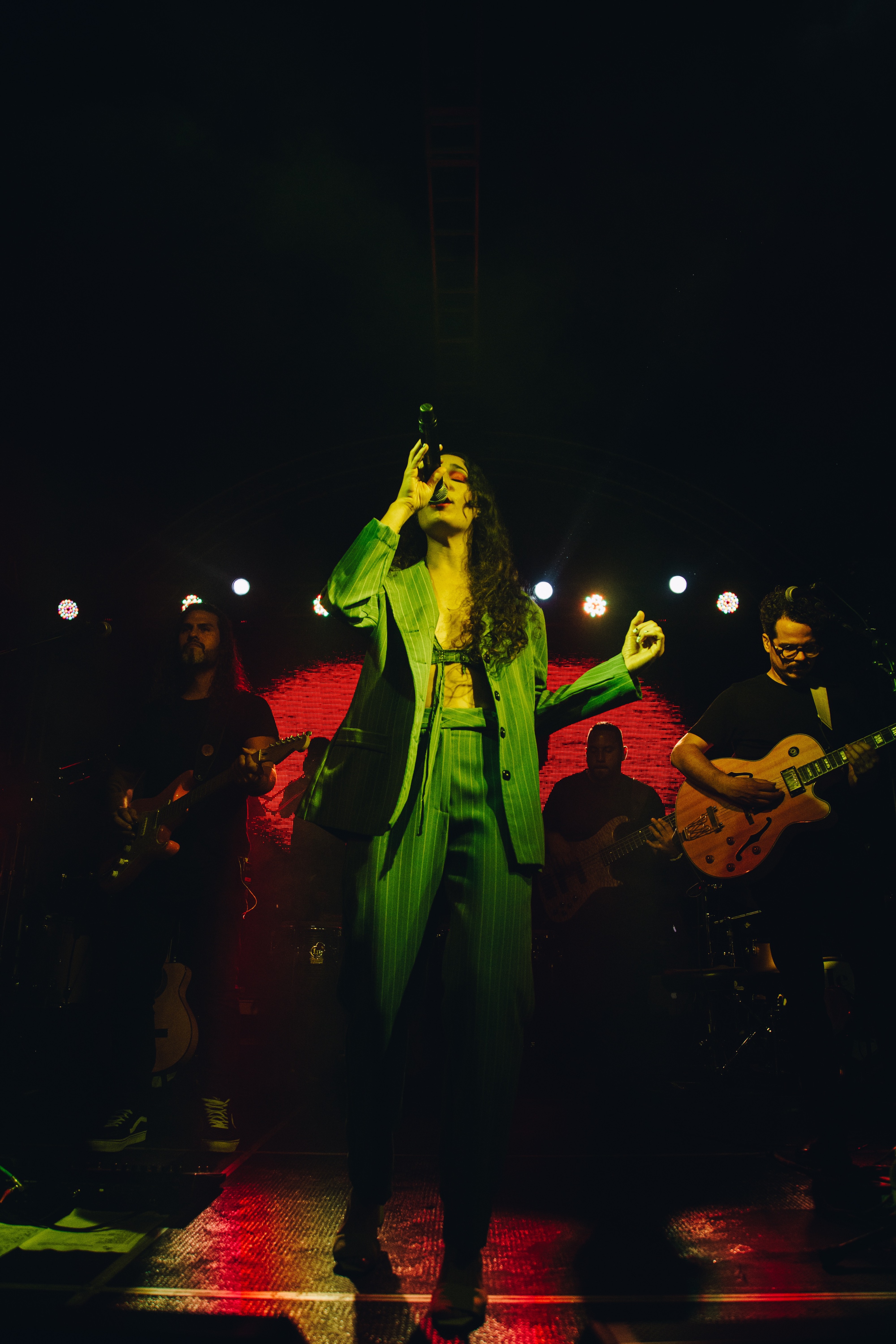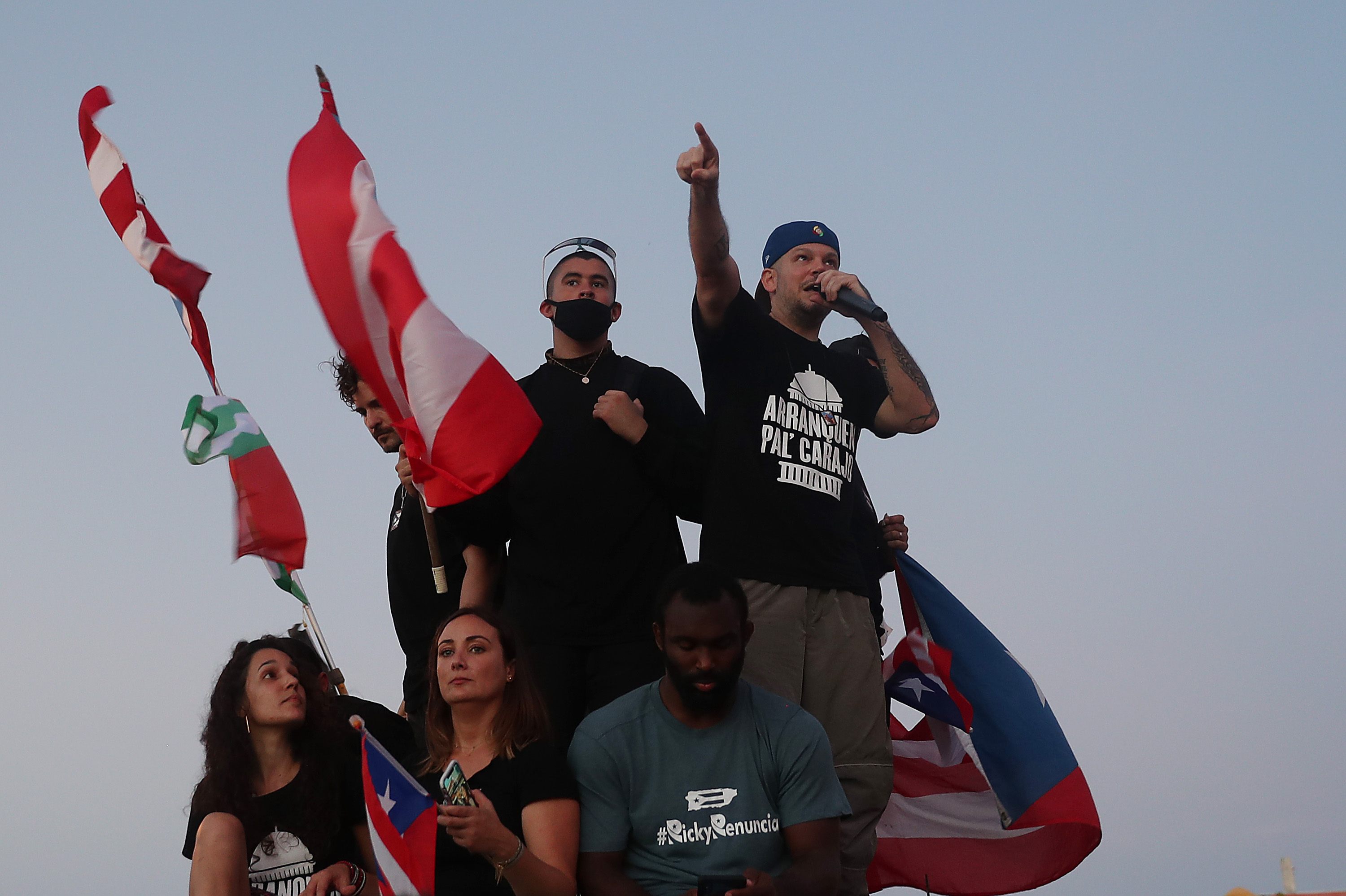The modernist and pristine 2-acre sculpture garden at San Juan’s Museo de Arte de Puerto Rico felt, at first, like a contradictory setting for artist and political activist Ileana Mercedes Cabra Joglar– aka iLe – to perform. At $30 plus fees, considering more than 40 percent of the archipelago’s residents are affected by poverty, the cost to attend this homecoming show was steep. Emerging as a leader in the people’s recent mass revolt against government malfeasance, which resulted in then-Governor Ricardo Rosselló’s resignation, iLe’s opting for this upscale setting was somewhat unsettling.
Is this the same artist who last month, alongside Bad Bunny and her brother, Residente, belted an emotional rendition of Lola Rodríguez de Tío’s original revolutionary hymn, “La Borinqueña,” to thousands of Puerto Ricans at the Capitol Building protest against Rosselló and U.S. colonialism?
A few songs into the concert, however, I came to understand the choice as a strategic one. While a more financially accessible show is totally still in order (this show doesn’t rule out the possibility of that happening), it is, after all, some members of the population unfazed by that ticket price who need to hear iLe’s messages most. In Puerto Rico’s fight for positive political and social change, for a better quality of life for everyone, the most comfortable of its citizens – the complacent, less affected, and privileged – must also be compelled to join the cause.

“Don’t be afraid to be a feminist,” iLe told the sold-out crowd of hundreds. “Join the movement. It’s for all of us.”
Her rallying call was delivered in the same breath as thanking La Colectiva Feminista en Construcción, a grassroots group that, for several years, including in reponse to the misogynist and homophobic comments of Rosselló’s leaked chat scandal last month, has been on the frontlines of protesting against femicides and other feminist issues. iLe also called out classism directly: “Just because horrible things haven’t happened to you doesn’t mean they can’t happen. This doesn’t happen to a group of people, a social class. These are things that could happen to anyone.”
In what became a diatribe, she boiled with anger: against the stupid comments of men even now, while she speaks; that women cannot walk the streets of Puerto Rico without fear; and her confusion at why some people, when respect is such a simple concept, continue to interfere with the happiness or safety of others.
She apologized for her fury, and a faction of the crowd responded with a resounding “noooooo,” reminding iLe that she has nothing to feel sorry about. Women often apologize when they don’t need to; knowing that is interalized misogyny 101. But like the inclusive language she used only sporadically (sometimes adding “todes” when saying “todas” and “todos,” but not consistently), the praxis of her feminism is a never-ending learning process – same as it is for anyone.
“Women don’t have a place in this world,” she reminded. She then played “Temes,” a song from Almadura that questions the roots of misogynist violence. Its video depicts the aftermath of a sexual assault, with a barely-moving iLe, sprawled out on concrete, as its singing survivor.
Months before this show, I spoke with iLe at Casa Ruth, a salmon-pink community center on a downtown Río Piedras corner. The San Juan neighborhood, with all its shuttered shops and deteriorating buildings, isn’t the bustling economic hub it was in decades past. Despite its historically important architecture, from 18th century churches to the University of Puerto Rico’s flagship campus, it’s not a celebrated historical area either. From the window where a sitting Ileana Cabra stares out, it’s about 10 minutes on foot to the university, and along the way, there’s at least as many trashed, dilapidated abandoned buildings than there are ones actively in use.
In Cabra’s line of sight is a bar that closed a few years back; across it, a corner wholesale shop opened not long ago, then a graffitied structure with its within-reach windows cemented shut to prevent unwanted entry. There’s two well-kept and partially commercially inhabited colonial-style buildings after that, then a gated-shut sewing store with super-tall, red, and now vintage, Singer lettering.
Between what’s bleak and dirty, though, there’s hope: A few new businesses, some iconic (namely, a longstanding independent ice creamery) and, of course, Casa Ruth, home not only to arts programming and workshops, but it’s also where residents and small businesses owners regularly convene to address local issues, plan improvements, and organize community events.
“It’s important to connect what happens in Puerto Rico to the rest of the world.”
It could be assumed that the more privileged present at iLe’s concert, many of them fans magnetized by her Grammy-winning debut, the achingly beautiful, boleros-inspired iLevitable, do not come to this area. But it was a fitting meeting place to ponder how its successor, Almadura – with its fists-up fuel for la lucha, “Contra Todo,” the condemnation of complacency in “Sin Masticar,” the anti-hate song “Odio” that, in its video, highlighted the 1978 Cerro Maravilla massacre and resulting cover-up – is a reflection of iLe’s evolution of mindset.
“I am in another energy, in another moment. I’m feeling a little angrier,” she laughed. “Or a little more conscious about what is making me feel angry.”
On Almadura, Cabra brings many concerns into the fold: gender-based violence, the Puerto Rican government’s wrongdoings, conformism and complacency, and disaster capitalism as another iteration of colonization.
“I thought mostly about the situation here, but it was written in a more universal way, because for me, it’s important to connect what happens in Puerto Rico to the rest of the world,” she explained. “Because we’re isolated, we feel alienated to what happens in the rest of the world.”
Education, she noted, is critical. And because of a lack of authentic Puerto Rican and Latin American history being taught in schools, “we don’t know enough about ourselves,” iLe said.
Cabra learned more, sociopolitically speaking, from her family and outside reading than she did in school: She remembers that in school the U.S. history book was exponentially larger than the Latin American text.
Education was a constant in our conversation. She noted public schools’ contribution to a colonized mindset by perpetuating the illusion of a positive relationship to the U.S. by omitting or glazing over offenses like the U.S. military occupation and nuclear bomb testing in Vieques, how Puerto Rican women were unwitting subjects of dangerous birth control trials in the 1950s, that the industrialization-centric Operation Bootstrap hurt independent farmers and caused mass out-migration, the U.S.’s multiple affronts to Puerto Rican culture and free speech – and so much more. And Puerto Rico’s history of pro-independence protest, such as the work of Albizu Campos and the Puerto Rican Nationalist Party or the successful movement in Vieques for the removal of the U.S. military, are not typically taught with reverential context.
There’s no way iLe could have predicted the historic events that unfolded in July. She couldn’t have known that Almadura would become an incredibly apt soundtrack to a movement to scour Puerto Rico’s government clean until it’s free of corruption – but that’s exactly what happened.
Fueled by Afro-Latin percussion, “Ñe Ñe Ñe,” a satirical critique of Puerto Rico’s government, became especially resonsant. Its message, as iLe describes it: Stop with the theater, stop pretending you don’t know what’s happening, and stop trying to buy the consciousness of the people.

What followed after Rosselló’s resignation certainly felt theatrical; because Secretary of State Luis G. Rivera Marín had resigned in the wake of #ChatGate, Puerto Rico’s governership suddenly started to feel like a Game of Thrones situation.
Before leaving office on Aug. 2, Rosselló nominated attorney Pedro Pierluisi as Secretary of State; quickly, Pierluisi publicly proclaimed the constitutionality of his governance, despite the lack of congressional confirmation as well as arguments against him due to potential conflicts of interest, like his role as an advisor to the U.S. Fiscal Oversight and Management Board that, since 2016, has overseen all of Puerto Rico’s legislation, as well as his work with AES, the energy company whose coal ash dumping in Peñuelas is, according to activists, extremely harmful to both the groundwater and residents’ health. Then the courts declared his swearing in unconstitutional – so Secretary of Justice Wanda Vázquez, constitutionally next in line after Secretary of State, was officiated as governor, despite having earlier publicly claimed she didn’t want the job, and despite public protests against her.
Unsurprisingly, in a follow-up interview a few weeks before her concert (and shortly before Vázquez took office), iLe said she feels more hopeful now than when we first spoke. Inspired by the revolt, her confidence in positive change for Puerto Rico had grown exponentially.
“The important thing is that now I feel like people are more clearly seeing the lies – the truth,” iLe said.
Ousting Rosselló was only the beginning; there is still work to do, and protests, as well as community discussion forums (asambleas del pueblo) are ongoing throughout the archipe “We can’t stop because we’re tired,” she added. And those who haven’t started, anyone who has yet to contribute in some way, be it physically protesting or by speaking out on social media, to this revolution, needs to start – now.
iLe opened her show Saturday with “Contra Todo,” but maybe instead she could have saved it for the grand finale. In it, flanked by brass accents like soldiers in solidarity, she declares, “With courage, I will win the battle / Made of wind and beach, I am the wave that will break / They want to see me fall / But I’ll put up a fight/ Climb the wall / I’ll go against everything to defend.”
At one point, she explicity asked who among the crowd had participated in the #RickyRenuncia protests. The cheers in response, however, were not loud enough for her liking: “I hoped it would be more,” she told concertgoers. “Qué bueno that you all went. But it should be more.”







